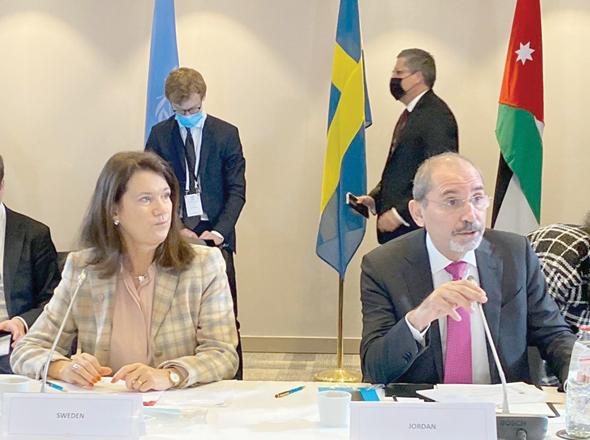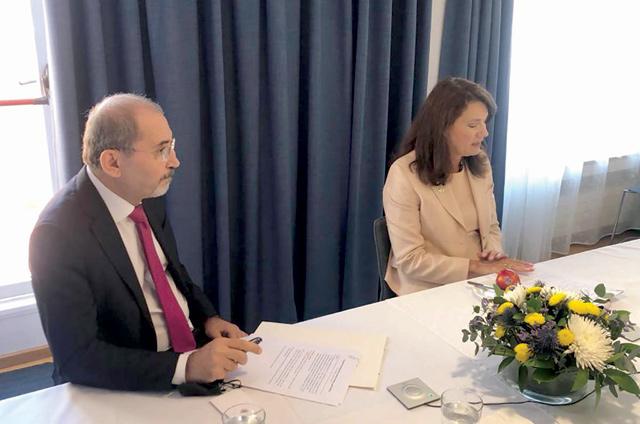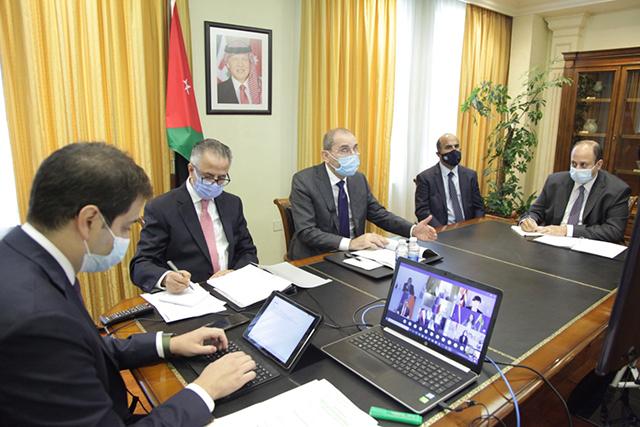You are here
Investment in UNRWA an investment in peace, hope — UN chief Guterres
By Rana Husseini - Nov 16,2021 - Last updated at Nov 17,2021

Deputy Prime Minister and Foreign Minister Ayman Safadi and Swedish Foreign Minister Ann Linde chair the international ministerial conference to support UNRWA in Brussels on Tuesday (Photo courtesy of Foreign Ministry)
AMMAN — Twenty-nine foreign ministers, state ministers, deputy ministers and representatives of 61 countries and international organisations on Tuesday participated in the international ministerial conference to support UNRWA, which was coorganised by Jordan and Sweden to mobilise political and monetary support to the UN agency.
Deputy Prime Minister and Foreign Minister Ayman Safadi and Swedish Foreign Minister Ann Linde chaired the conference that was held in Brussels, Belgium, according to a Foreign Ministry statement.
UN Secretary General António Guterres spoke during the event about the pivotal role of UNRWA in the lives of generations of the Palestinian refugees and its critical role in enhancing regional stability.
Guterres stressed that despite countries’ approval of the UN mandate to UNRWA, it is still facing an existential crisis, calling for providing it with enough and sustainable support that can enable it to provide its vital services to Palestinian refugees and bridge the financial gap immediately, saying that “investment in UNRWA is an investment in peace and hope”.
In his inaugural speech, Safadi stressed the importance of the international community to continue to provide financial support to the agency.
He added that UNRWA is suffering from a financial deficit of up to $100 million for this year.
He emphasised the need to support the agency so it can offer its services to over five million Palestinian refugees and provide a decent life to them and UNRWA employees, who count on their monthly salaries to live in dignity.
The minister also highlighted the importance of guaranteeing the rights of more than 500,000 Palestinian children to education and refugees’ rights in inalienable health service.
He stressed that the role of the agency is “indispensable and a stability factor for the region”.
The deputy prime minister also rejected all proposals that targeted UNRWA and claimed the impossibility of its sustainability due to finance shortages. He stressed that the sustainability of UNRWA operations is a “responsibility of all through a mechanism of sharing burdens”.
He also praised the US decision to resume assistance to the agency, offering some $318 million for this year.
The minister also said that the Kingdom, which is the biggest supporter of UNRWA and Palestinian refugees, will continue working with partners and the agency to guarantee sustainable support to the agency and cover its budget deficit.
Safadi also expressed appreciation for his Swedish counterpart for the deep-rooted and fixed partnership in supporting the agency.
Linde expressed her gratitude for the agency’s efforts in these difficult circumstances, stressing that the conference constitutes an opportunity to renew solidarity with Palestinian refugees and the agency’s important role and international mandate.
She also called for sustaining the support for UNRWA until reaching a settlement for the refugee issue.
UNRWA Commissioner General Philippe Lazzarini thanked Safadi and Linde for organising this conference, stressing that UNRWA’s vision is based on commitment to ensuring the sustainability of the agency’s services to all refugees in their journey towards self-reliance.
He also said that the conference included pledges from countries worth $38 million.
The conference issued a final communique that stressed the main role of UNRWA in supporting Palestinian refugees and enhancing regional stability, stressing the need to enable it to respond to these refugees’ needs.
The communique also reviewed UNRWA’s plans to guarantee effective action while implementing its tasks according to its UN mandate, which will contribute to implementing its multi-year strategy, expected in 2022.
In a virtual press conference also held on Tuesday, following the ministerial conference’s conclusion, Safadi reiterated that the international community cares about ensuring the continuity of UNRWA and its services.
“We want to reiterate that UNRWA will not be abandoned and neither will the refugees,” Safadi told the press conference.
UNRWA’s continuation is vital to provide the dignified life that Palestinian refugees deserve, Safadi said.
“UNRWA is sustainable and is indispensable. But what is unsustainable is the lack of certainty about the funds it has worked with in delivering its mandate,” Safadi said.
“We continue to work with our partners to support efficient funding to UNRWA,” the deputy prime minister added.
This meeting was able to send a message to the agency and the Palestinian people that they will not be abandoned, Safadi stressed.
“Supporting UNRWA is supporting the right of Palestinians refugees to live with dignity; Jordan will continue to work for and will not waver its efforts to ensure this will happen,” he added.
Safadi also thanked the Swedish government for its tremendous partnership to ensure the conference’s success and rally support for the UN agency.
UNRWA Commissioner General Philippe Lazzarini also addressed the press saying that the organisation aims to deliver services in line with their mandate.
“We want to make sure that we do not leave any Palestinian refugees behind,” Lazzarini stressed.
UNRWA operates critical health, education, social protection and other services in the West Bank, including East Jerusalem, Gaza, Jordan, Syria and Lebanon at an annual budget of around $ 800 million.
Additional end-of-year contributions amounting to $38 million leave UNRWA still in need of $60 million for 2021, according to an UNRWA statement.
At the conference, eight member states announced a cumulative/total of over $614 million in new or renewed multiyear agreements with durations from two to five years.
The combination of these and existing multiyear pledges, if all fully realised at expected levels, would equate to 40 per cent of the agency’s core budget needs for 2022, said the statement.
Related Articles
AMMAN — In a trilateral meeting in Madrid on Monday, Deputy Prime Minister and Foreign Minister Ayman Safadi, Swedish counterpart Ann Linde
AMMAN — Deputy Prime Minister and Minister of Foreign Affairs and Expatriates Ayman Safadi and Swedish Foreign Minister Ann Linde on Thursda
AMMAN — Deputy Prime Minister and Foreign Minister Ayman Safadi and his Swedish counterpart Ann Linde on Wednesday night in New York held a


















